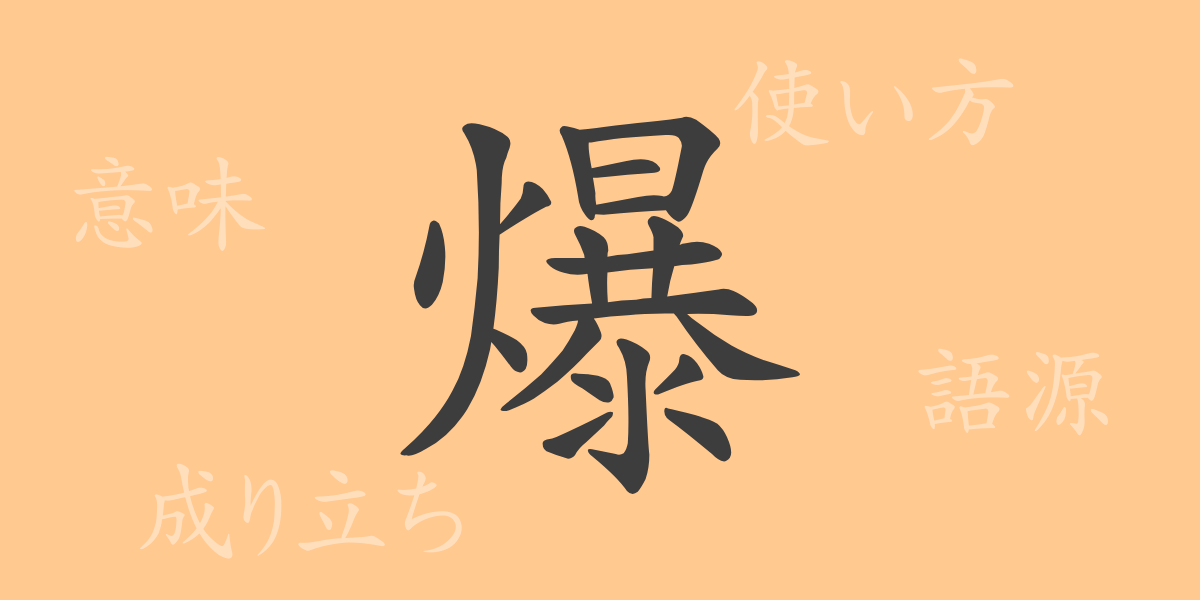In Japanese culture, many characters serve to powerfully express emotions and scenery. Among them, the kanji “爆 (ばく/baku)” is known for evoking a strong, explosive image. In this article, we will delve into the character “爆,” exploring its origins, modern usage, and even common phrases used in everyday life. Don’t miss this opportunity to discover the appeal of “爆,” a character commonly used in Japanese.
Origins of 爆 (ばく/baku)
The kanji “爆 (ばく/baku)” is composed of the character for fire, “火 (ひ/hi),” and the character “暴 (ぼう/bou),” which also represents fire. Originally, “暴” was formed from the radical for rain, “雨 (あめ/ame),” combined with “甫,” signifying a powerful motion, to describe the image of rain falling violently and causing chaos. This meaning evolved into “to rage” or “to go berserk.” Adding the element of “火 (ひ/hi)” transforms the meaning to describe the explosive force of fire, leading to the modern sense of an explosion.
Meanings and Usage of 爆 (ばく/baku)
The kanji “爆 (ばく/baku)” is used to indicate explosions, rapid increases, or strong impacts. For instance, “爆発 (ばくはつ/bakuhatsu)” refers to a physical explosion, whereas “爆笑 (ばくしょう/bakushou)” is used to describe a scene where people burst into loud laughter. Additionally, the term “爆売れ (ばくうれ/bakuure)” signifies a product that sells rapidly, often used in economic contexts.
Readings, Stroke Count, and Radical of 爆 (ばく/baku)
Despite its strong imagery, the kanji “爆 (ばく/baku)” is relatively straightforward in its readings and structure.
- Readings: The *on’yomi* (音読み) is “バク (baku).” It does not have a common *kun’yomi* (訓読み).
- Stroke count: “爆 (ばく/baku)” consists of 15 strokes.
- Radical: The radical is “火 (ひ/hi)” for fire, but the “暴 (ぼう/bou)” element is also a key component of its structure.
Common Phrases, Idioms, and Proverbs Using 爆 (ばく/baku)
The character “爆 (ばく/baku)” is featured in many phrases and idioms, often emphasizing its powerful imagery. Here are some examples:
- 爆発 (ばくはつ/bakuhatsu): A phenomenon where an object suddenly bursts, releasing energy with a loud noise.
- 爆笑 (ばくしょう/bakushou): To burst into loud laughter, representing something extremely funny or entertaining.
- 爆睡 (ばくすい/bakusui): Refers to sleeping deeply and soundly, indicating a state of restorative rest.
- 爆売れ (ばくうれ/bakuure): A term for when a product sells extremely well, indicating great success in the market.
- 爆走 (ばくそう/bakusou): Describes running at high speed, often used to illustrate cars or people running furiously fast.
Conclusion on 爆 (ばく/baku)
The kanji “爆 (ばく/baku)” is an indispensable element in Japanese expressions due to its powerful imagery and versatile usage. Derived from the force of fire, this character literally embodies explosive power and is utilized in various contexts. From casual conversations to specialized topics, the dynamic nature of “爆 (ばく/baku)” continues to captivate and leave a lasting impression. Understanding the energy and range of expression inherent in “爆 (ばく/baku)” allows for more nuanced and impactful communication.

























